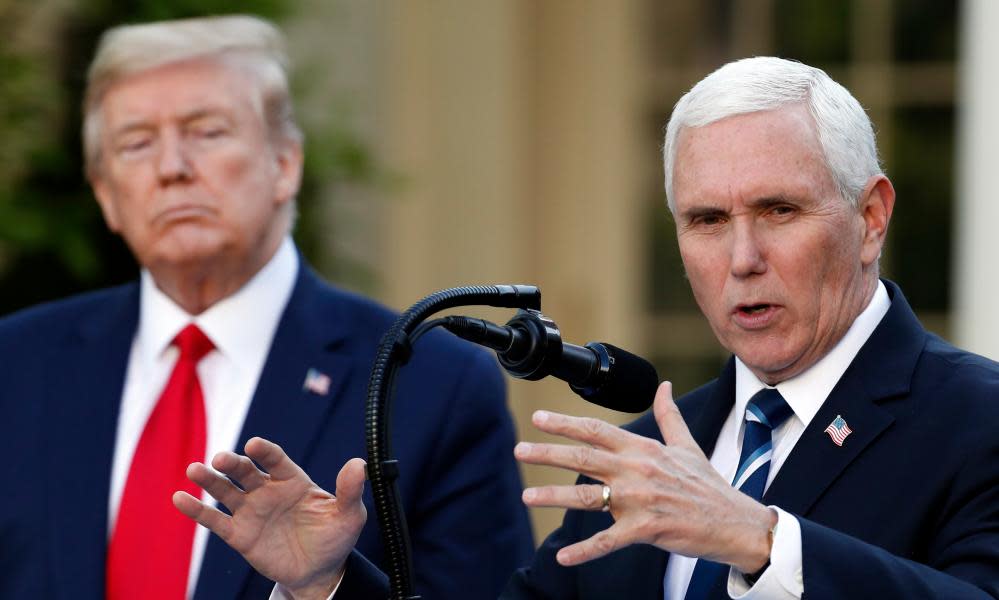Trump loses appeal to stop Pence from testifying in January 6 investigation

- Oops!Something went wrong.Please try again later.
- Oops!Something went wrong.Please try again later.
- Oops!Something went wrong.Please try again later.
- Oops!Something went wrong.Please try again later.
A federal appeals court has denied Donald Trump’s emergency motion to block Mike Pence from testifying in a criminal investigation into efforts to overturn the 2020 election, paving the way for the special counsel examining the matter to obtain potentially inculpatory accounts of Trump’s desperate attempt to stay in power.
Related: Top Trump adviser to be interviewed by special counsel prosecutors
The sealed ruling by the US appeals court for the DC circuit on Wednesday marks the end of Trump’s efforts to keep Pence from divulging information to federal prosecutors, unless his legal team takes the unlikely step of challenging the decision before the full DC circuit or the supreme court.
Pence is considered a potentially consequential witness because Trump pressured him to unlawfully reject electoral college votes for Joe Biden at the joint session of Congress and was at a December 2021 meeting at the White House with Republican lawmakers who discussed objections to Biden’s win.
The two interactions are of particular investigative interest to the special counsel Jack Smith as his office examines whether Trump sought to unlawfully obstruct the certification and defraud the United States in seeking to overturn the 2020 election results.
Prosecutors have been trying to get Pence’s testimony for months, starting with requests from the justice department last year and then through a grand jury subpoena issued by Smith, who inherited the sprawling criminal investigation.
The subpoena was challenged by Trump’s lawyers, who invoked executive privilege to limit the scope of Pence’s testimony, as well as by Pence’s lawyer, who argued his role as president of the Senate on January 6 meant he was protected from legal scrutiny by the executive branch.
Both requests to limit the scope of Pence’s testimony were largely denied by the new chief US judge for the court, James Boasberg, who issued a clearcut denial to Trump and a more nuanced ruling to Pence that upheld that he was protected in part by “speech or debate” protections.
As a result, the former vice-president’s team declined to challenge the ruling. But Trump’s legal team disagreed, and filed an emergency motion to the US appeals court for the DC circuit – which was denied late on Wednesday by judges Gregory Katsas, Patricia Millett and Robert Wilkins.
A lawyer on the team representing Trump in the special counsel cases could not say whether they would appeal the ruling to a higher court, though such a move is not expected.
In the wake of election day, Trump tried to pressure Pence into helping him reverse his defeat by using his largely ceremonial role as the presiding officer of the Senate on January 6 to reject legitimate slates of electors for Biden and prevent his certification.
The effort relied in large part on Pence accepting fake slates of electors for Trump – a scheme that is also the subject of the criminal investigation – to create a pretext for casting doubt on the election results and stopping Biden from becoming president.
The pressure campaign stemmed from Trump alongside figures inside and outside the government, including Trump’s lawyer John Eastman, other Trump campaign-affiliated lawyers like Sidney Powell and Rudy Giuliani and dozens of Republican members of Congress.
Pence was among the few people who had one-on-one discussions with Trump on the day of and the day before the Capitol attack, which House January 6 select committee investigators last year concluded was a conspiracy that the former president had some advance knowledge of.
Since Pence is precluded from testifying about any preparations for his role as presiding officer of the Senate it remains unclear how illuminating his testimony might be for prosecutors.
But Pence’s team has long maintained in private that he can testify about other efforts by Trump, the Trump campaign and outside individuals to overturn the 2020 election results that could speak to their state of mind in the weeks from November 2020 to Biden’s inauguration.

